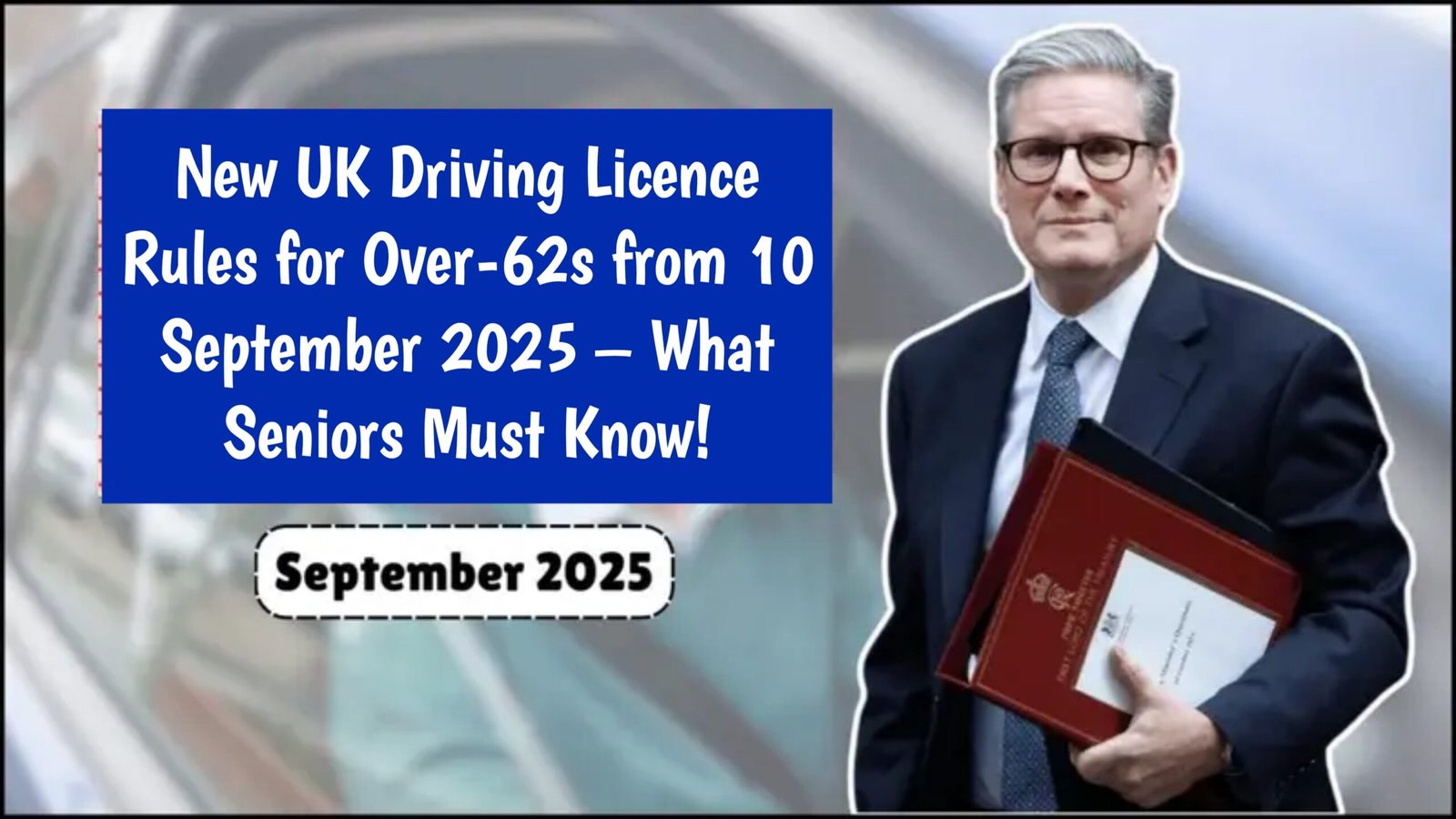From 10 September 2025, new rules will apply for UK drivers aged over 62. One of the biggest changes relates to how often you need to renew your driving licence. Until now, most drivers renewed their licence at 70 and then every three years. However, under the new regulation, those aged 62 and above will be asked to update their licence details more frequently. This update is part of a broader effort by the Driver and Vehicle Licensing Agency (DVLA) and the Department for Transport (DfT) to improve road safety. Seniors will now need to confirm their fitness to drive earlier, which means the renewal process begins before reaching the age of 70.
Medical checks for older drivers
Another key change is the introduction of mandatory medical checks for drivers over 62. The UK government has stressed that this is not intended to force seniors off the road but to make sure they are driving safely. The checks may include eyesight tests, general health assessments, and in some cases, doctor’s certificates to confirm safe driving ability. Conditions such as diabetes, heart disease, or vision-related issues could require additional evidence before a licence is renewed. This is important because statistics show that older drivers are more likely to face health conditions that might affect reaction times or road awareness.
Impact on driving licence fees
Many seniors are also asking whether these changes will increase the cost of holding a driving licence. Currently, standard renewal fees are relatively low, and many over-70s enjoy free licence renewal. Under the new 2025 rules, the government has suggested that renewal for over-62s will remain affordable, but additional costs could arise if a medical report or eye test is required. Pensioners on fixed incomes should be aware of these potential expenses when budgeting. However, officials have hinted at possible discounts or concessions for seniors to prevent financial hardship.
Online renewal process
The DVLA is encouraging all drivers over 62 to use the online licence renewal system starting from 10 September 2025. This system is designed to be faster, more secure, and easier than paper applications. Seniors who are less confident with technology may find the process challenging, but the DVLA has promised additional support, including a helpline and step-by-step guidance. Local post offices may continue to offer in-person services, but the emphasis will be on digital applications. By shifting to online systems, the government hopes to reduce delays and administrative errors that have previously caused long waiting times.
Effects on insurance policies
Car insurance companies closely monitor changes in driving licence rules, and the new system could directly affect premiums for seniors. With mandatory health checks and more frequent renewals, insurers may view older drivers as either safer (because they are medically cleared) or higher risk (because age alone is a factor). Some providers may offer discounts to drivers over 62 who can show strong medical and vision results. Others may raise premiums slightly because of age-related risks. Seniors should review their policies carefully and compare multiple insurance options to avoid overpaying.
Why the rules are changing
The UK government has explained that the new driving licence rules are part of a long-term road safety strategy. With more seniors staying active and driving into their 70s and 80s, officials want to balance independence with safety. Research has shown that drivers in their early 60s are generally safe, but risks increase gradually with age. By starting the renewal and medical check process earlier, the DVLA hopes to identify potential issues before they become serious problems. These rules are also meant to reassure families who worry about the safety of elderly relatives behind the wheel.
Concerns among senior drivers
Many senior drivers have expressed concerns about the fairness of the new rules. Some argue that age alone should not determine fitness to drive, while others fear unnecessary bureaucracy. Advocacy groups for the elderly have warned that stricter renewal requirements could lead to loss of independence for those who rely on their cars, especially in rural areas where public transport is limited. The government has responded by stating that the rules are not meant to discriminate but to ensure equal safety standards for all drivers. They have also promised consultation with senior groups to refine the system after it comes into effect.
Preparing for the September 2025 changes
Seniors who will be 62 or older by 10 September 2025 should start preparing early. This means ensuring your eyesight is tested, keeping your GP records updated, and checking your current driving licence expiry date. It may also be useful to learn how to use the DVLA online portal in advance. Families can support older relatives by helping with applications, booking medical appointments, or providing technical guidance for online forms. By staying prepared, the renewal process can be smoother and less stressful.
Support for vulnerable pensioners
Not all seniors will find the transition easy. To address this, the government is planning special support for vulnerable pensioners, such as those with disabilities, limited internet access, or financial difficulties. Community centres, local councils, and charities may also provide help in understanding and following the new driving licence rules. It is expected that additional funding will be allocated to awareness campaigns and training programs for seniors in the months leading up to the September 2025 launch.
Final thoughts on the new rules
The new driving licence rules for over-62s coming into effect on 10 September 2025 mark one of the biggest updates for older UK drivers in recent years. While the changes may feel overwhelming, the overall aim is to keep seniors safe and independent on the road for as long as possible. By introducing earlier renewals, mandatory health checks, and online applications, the government hopes to modernise the system while reducing risks. For older drivers and their families, the key will be preparation and understanding. With the right support, these changes could ultimately give seniors more confidence rather than less.
